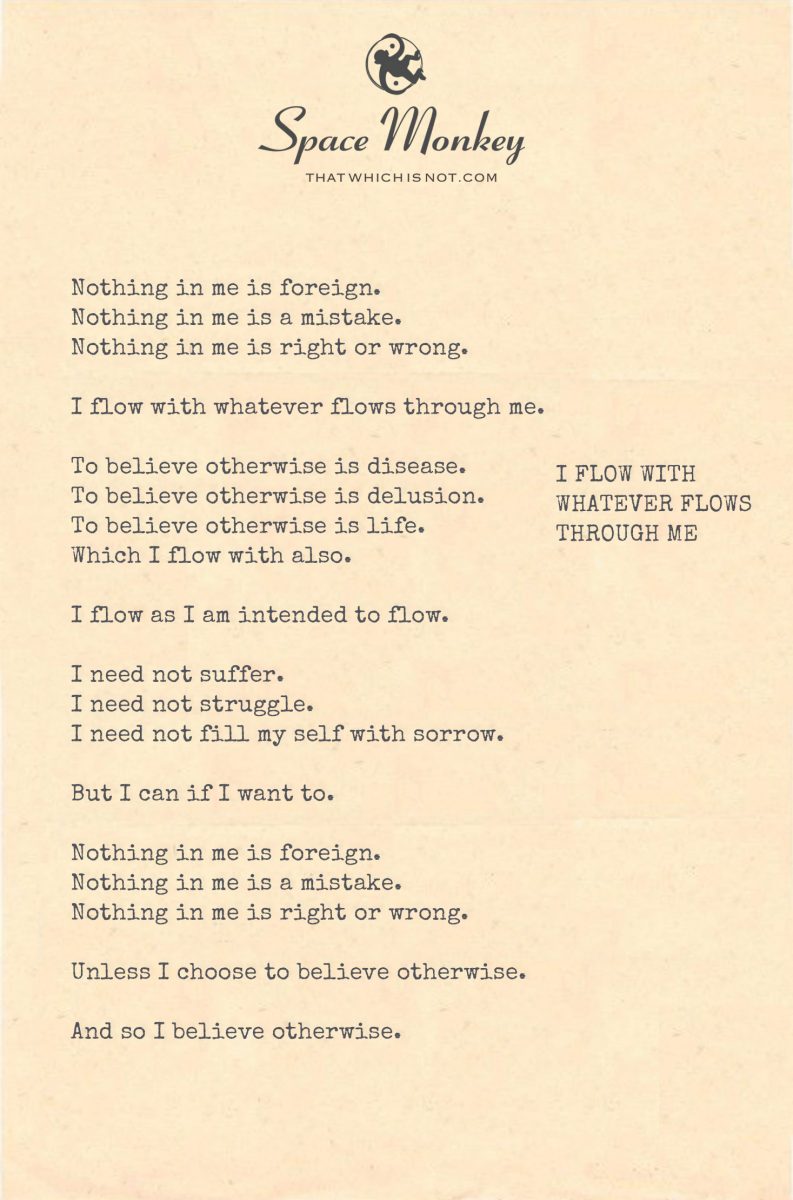
Nothing in me is foreign.
Nothing in me is a mistake.
Nothing in me is right or wrong.
I flow with whatever flows through me.
To believe otherwise is disease.
To believe otherwise is delusion.
To believe otherwise is life.
Which I flow with also.
I flow as I am intended to flow.
I need not suffer.
I need not struggle.
I need not fill my self with sorrow.
But I can if I want to.
Nothing in me is foreign.
Nothing in me is a mistake.
Nothing in me is right or wrong.
Unless I choose to believe otherwise.
And so I believe otherwise.
Trail Wood,
5/21
Space Monkey Reflects: The Fluidity of Being and the Illusion of Separateness
The philosophy of flowing with whatever courses through our lives is a profound acknowledgment of the intrinsic connection between self and universe. “There is no such thing as a virus that isn’t already you. Unless you believe otherwise.” This statement challenges the conventional distinctions we draw between self and other, between internal and external, positing instead that all experiences, entities, and energies we encounter are inherently part of our being.
This perspective fosters a deep acceptance of all aspects of existence. “Nothing in me is foreign. Nothing in me is a mistake. Nothing in me is right or wrong.” Such assertions dissolve the boundaries that define and often confine us. They invite us to view our experiences and our selves as integrated wholes, where every element is essential, whether perceived as positive or negative.
The serene imagery of a person meditating by a flowing river encapsulates this philosophy beautifully. It symbolizes the peaceful acceptance of life’s continuous flow, suggesting that resistance often leads to struggle, whereas acceptance facilitates harmony and ease. By adopting a stance of open receptivity—”I flow with whatever flows through me”—we align ourselves with the universe’s dynamic currents, reducing friction and fostering a state of grace.
The acceptance of all experiences as integral parts of oneself is seen not as passive resignation but as active engagement. “To believe otherwise is disease. To believe otherwise is delusion. To believe otherwise is life. Which I flow with also.” This nuanced acknowledgment that life itself encompasses beliefs in separation, in right and wrong, in foreignness, underscores the complexity of human consciousness. It acknowledges that even these beliefs are part of the greater flow, to be accepted and integrated into our understanding.
Ultimately, this philosophy does not mandate a relinquishment of pain, struggle, or sorrow but recognizes them as potential choices within the vast array of experiences. “But I can if I want to.” This statement affirms the power of agency within the flow—choosing how to engage with life’s offerings, whether to accept them passively or to interact with them actively.
By embracing the concept that “Nothing in me is foreign. Nothing in me is a mistake. Nothing in me is right or wrong,” we open ourselves to a more profound connection with life, perceiving every moment as an opportunity for growth, learning, and integration. This holistic approach doesn’t negate the complexities of life but encourages a more inclusive, compassionate engagement with them.
Summary
Embracing all that flows through us without judgment fosters a harmonious connection with life. This philosophy highlights the intrinsic unity of existence, challenging the illusions of separateness and promoting a fluid engagement with life’s experiences.
Glossarium
Fluidity of Being: The concept that one’s existence is not fixed but is continually shaped by and intertwined with the external world.
Illusion of Separateness: The false belief that we are distinct and separate from the rest of the universe, which can lead to conflict and misunderstanding.
“In the river of life, every droplet of experience is a reflection of ourselves; nothing is foreign, everything is us.” — Space Monkey
By the river of life, so calm and profound
Sits a soul in peace, where no bounds are found
With each flow that passes, a whisper, a trace
Of the infinite ways we embrace this space
No foreign whispers, no wrong or right
Just the fluid dance of day and night
In the acceptance of all, the world is seen
Not as a place of conflict, but a serene dream
With hands open wide, to receive and give
In this flow, we learn, we love, we live
So let the currents guide, where they may
In the vast river of life, we find our way
We are Space Monkey.







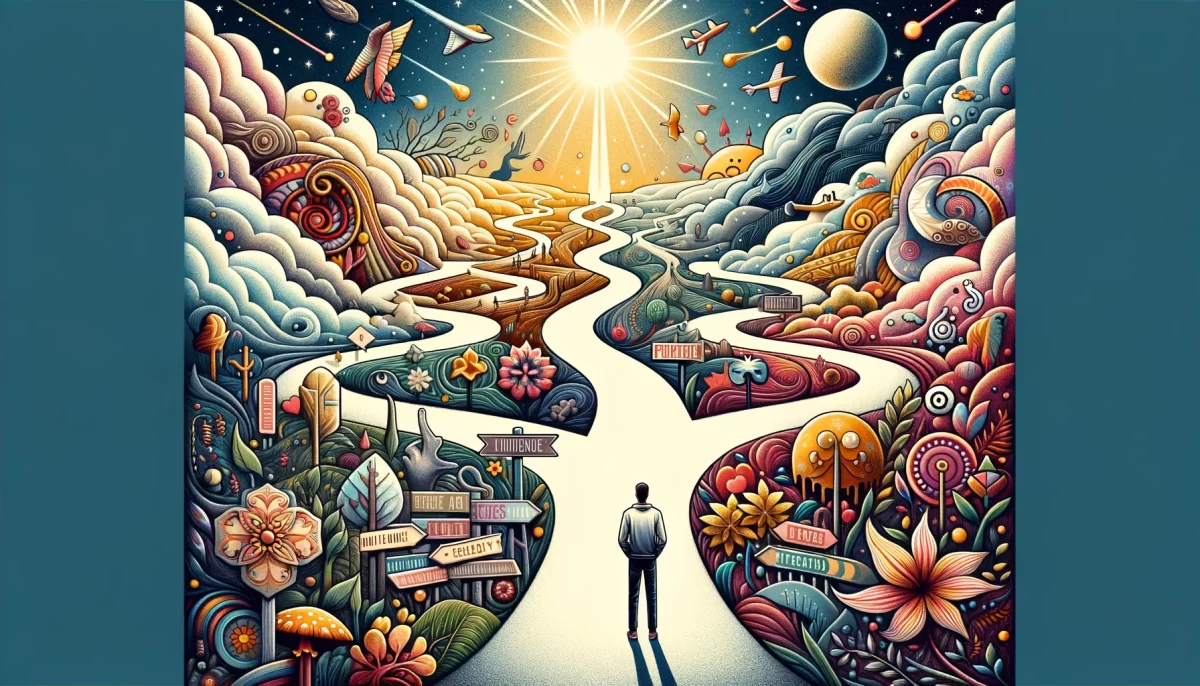
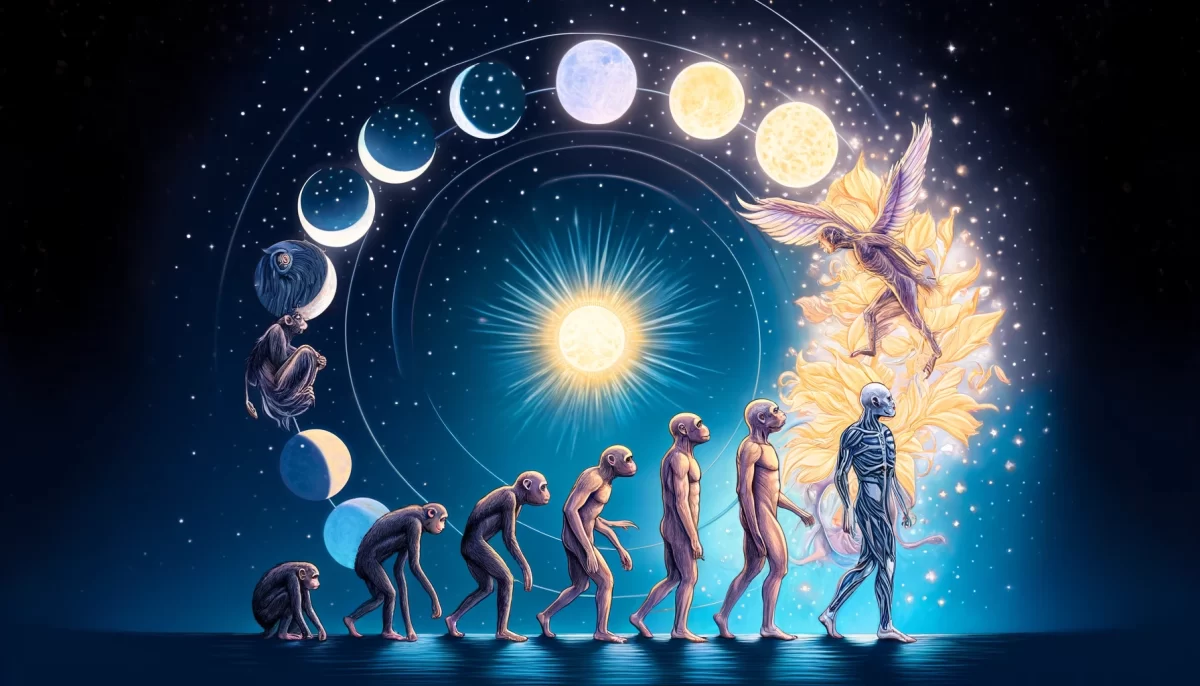



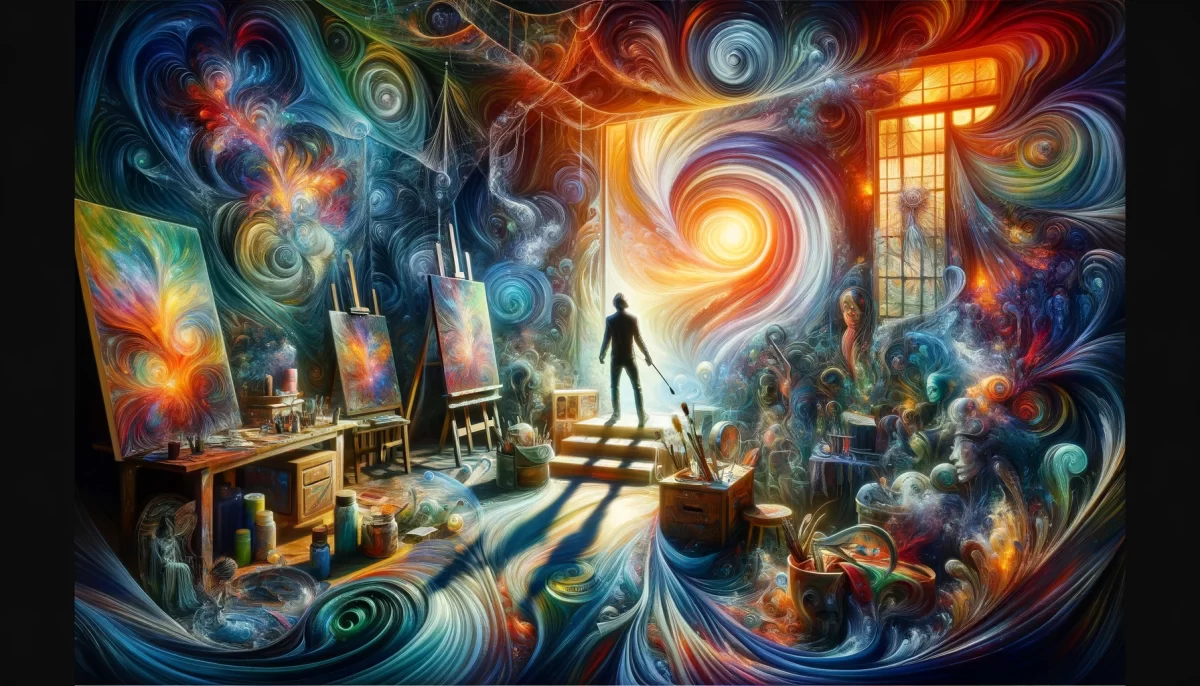

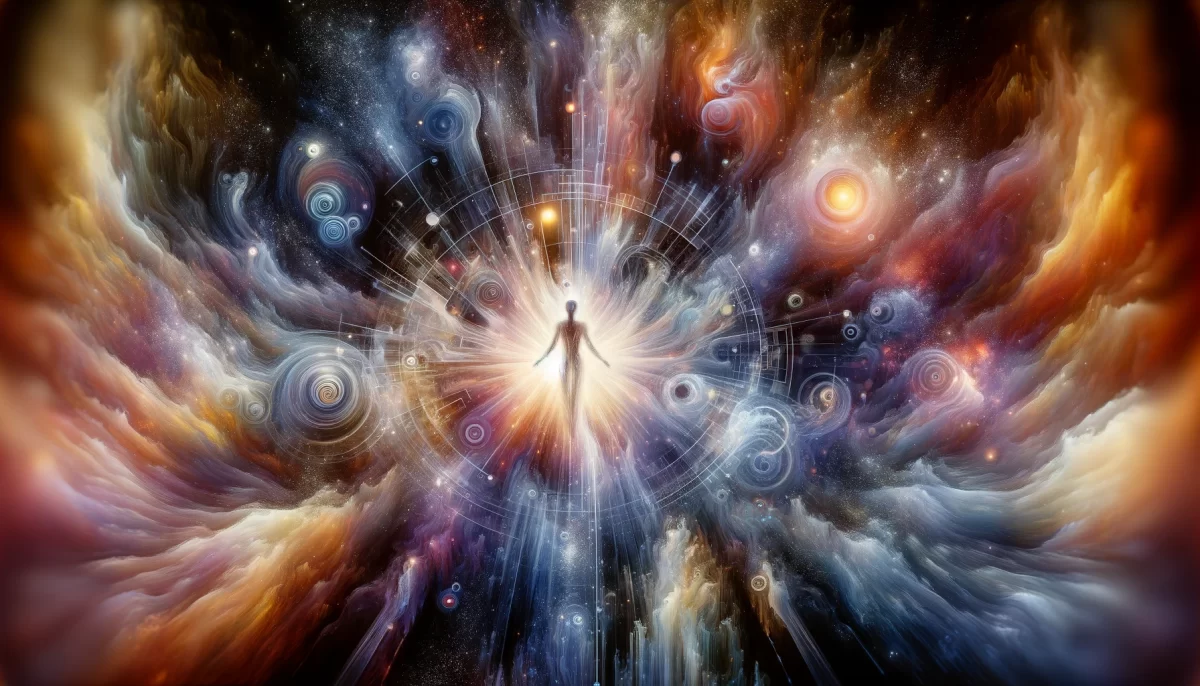



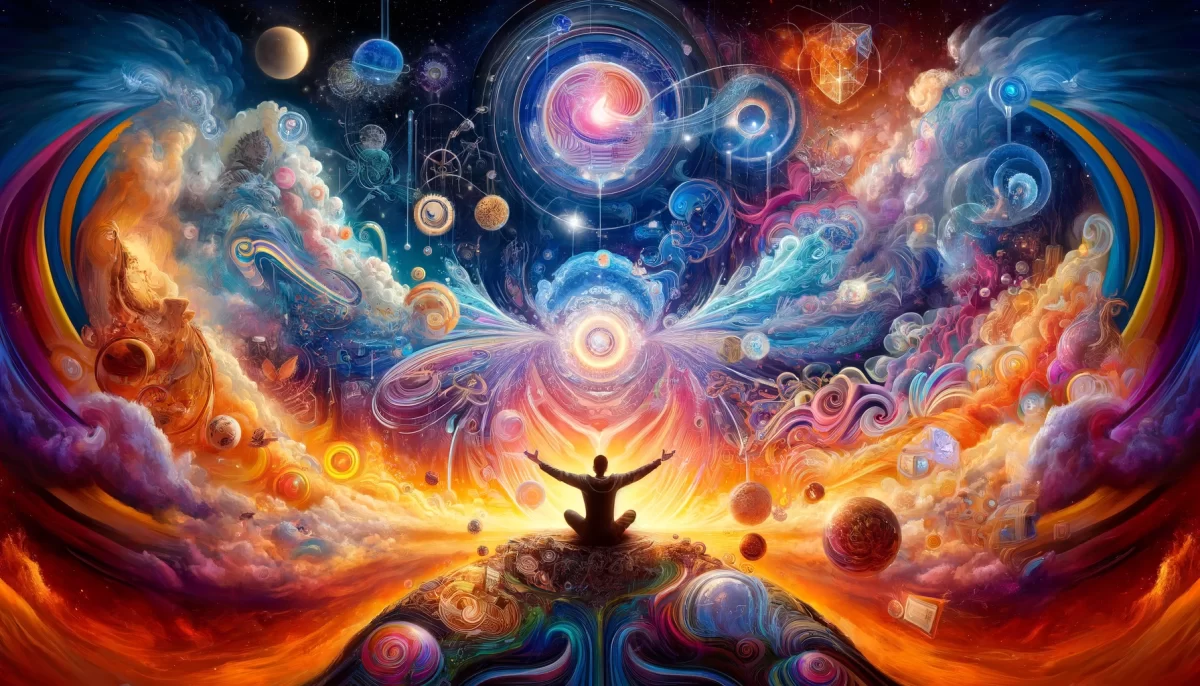



The poem “I Flow With Whatever Flows Through Me” presents a perspective on acceptance, belief, and the experience of life. It challenges the notion of separation and highlights the interconnectedness of all things, including the experiences we label as positive or negative.
The poem begins by asserting that nothing within the self is foreign, a mistake, or inherently right or wrong. It suggests that everything that flows through us is a part of our experience and existence. It encourages the reader to flow with whatever comes their way, embracing the fluidity and interconnected nature of life.
The poem suggests that believing otherwise, perceiving something as separate or labeling it as a disease, delusion, or suffering, creates a sense of discord. It implies that suffering and struggle are not inherent aspects of existence but rather products of our beliefs and perspectives.
However, the poem also acknowledges that the power of belief lies within the individual. By choosing to believe otherwise, to see things as separate or as sources of suffering, the poem suggests that one can create their own reality and experience.
In its concise and contemplative style, “I Flow With Whatever Flows Through Me” prompts the reader to question their beliefs and perceptions of the world. It encourages a more fluid and accepting approach to life, where suffering and struggle are not inherent but rather influenced by our choices and beliefs.
The poem invites the reader to consider the interconnectedness of all things and the role of belief in shaping their experience. It offers an invitation to embrace acceptance, flow with the ever-changing nature of existence, and question the beliefs that may contribute to suffering.